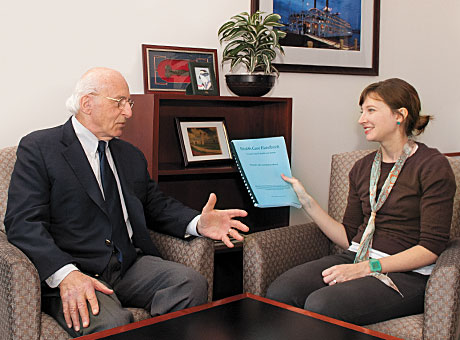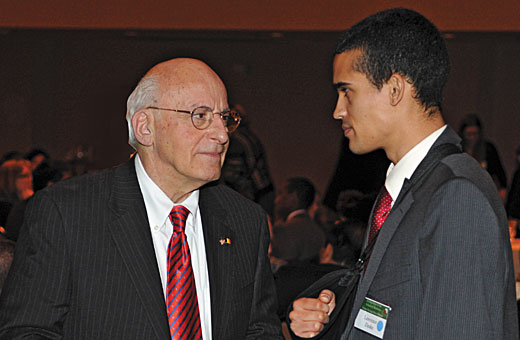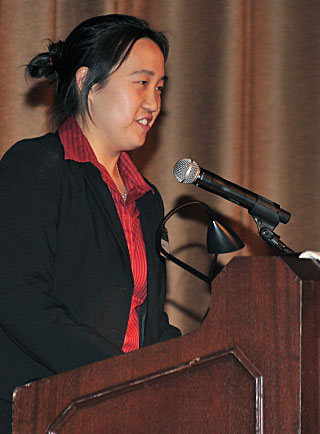
William A. Peck, MD, meets with second-year medical student Elisabeth T. Askin. Peck mentored Askin and third-year medical student Nathan H. Moore on a book they co-wrote for health professions students that explains U.S. health care system basics.

William A. Peck, MD, meets with second-year medical student Elisabeth T. Askin. Peck mentored Askin and third-year medical student Nathan H. Moore on a book they co-wrote for health professions students that explains U.S. health care system basics.
Kevin R. Patel, MD 11, is a gifted young doctor planning a research career — a dream he is able to follow because, when he arrived at Washington University School of Medicine in 2007, he joined the distinguished ranks of Peck Scholars, recipients of scholarships given to medical students based on need and merit.
Now a neurology resident at Barnes-Jewish Hospital, Patel is reaping the benefits of his experience as a Peck Scholar: the knowledge that he received his education at one of the finest medical schools in the nation and the freedom from the full burden of medical school debt that allows him to pursue his passion for research.
Originally established in 2003 to honor William A. Peck, MD, when he stepped down after 14 years as executive vice chancellor for medical affairs and dean of Washington University School of Medicine, the Peck Scholars program has a simple goal: “We want,” Peck says, “to reward excellence.” Thirty-nine exceptional students have received these prestigious grants since 2004.
Peck, the Alan A. and Edith L. Wolff Distinguished Professor of Medicine and director of the university’s Center for Health Policy, says he needed “about one nanosecond” when asked what the school might do to honor him.

Peck talks with medical student and Peck Scholar Lawrence R. Zieske at the annual School of Medicine scholarship dinner.
“I thought it was very important to enhance our scholarship program,” he says. The support of his friends and colleagues was “overwhelmingly” generous, he adds, “because the cause is so worthy.” Commitments to the fund today total nearly $4.5 million. Peck and his wife, Patricia, are themselves major supporters.
Overall, the school’s robust aid program has helped it rise to the top in student selectivity rankings. “It enables us to continue to attract the top students,” says Peck. “These students are outstanding. I’m overwhelmed by their intelligence.
“They’re obviously excellent students, but it goes far beyond that,” Peck notes. “They have a wide range of extracurricular interests. They have open minds. They’re altruistic, providing services for the underserved. They’re filled with initiative; they’re entrepreneurial. It’s amazing to get to know them.”
Medical school debt looms large in the minds of students and graduates, Peck observes. It not only discourages would-be researchers, but also steers students away from lower-paying medical specialties.

Medical student and Peck scholar Jennifer Yu made remarks on behalf of the students at the event.
Peck makes a point of getting to know the scholars, which further enriches their Washington University experience. “He offers his time to educate medical students on health policy-related issues,” Patel notes. “I’ve met him on a number of occasions. He’s played a significant role in my medical education.”
For second-year medical student Elisabeth T. Askin, the relationship has been inspiring. Peck has been a mentor on a writing project she co-authored with third-year medical student Nathan H. Moore — a book for health professions students that explains U.S. health care system basics. They met with Peck monthly as they researched and wrote the book, which will soon be published.
“He is a fantastic mentor,” Askin says. “He pushes me when he knows I can do better. He helps me be the kind of student I want to be. He’s unflagging in his support.”
Jennifer Yu, a Peck Scholar and aspiring surgeon graduating this spring, expresses similar gratitude. “There’s no way I would have been able to pursue such a high-caliber education without the support of the Peck Scholars program and Dr. Peck.”
Yu was the student selected to speak to assembled scholarship students and benefactors at the annual dinner last fall. In her remarks, she addressed “these heroes, these sponsors of our dreams” and said, “Thank you for giving us the chance to pursue the Washington University experience and to join the ranks of those who are even now changing the face of medicine.”